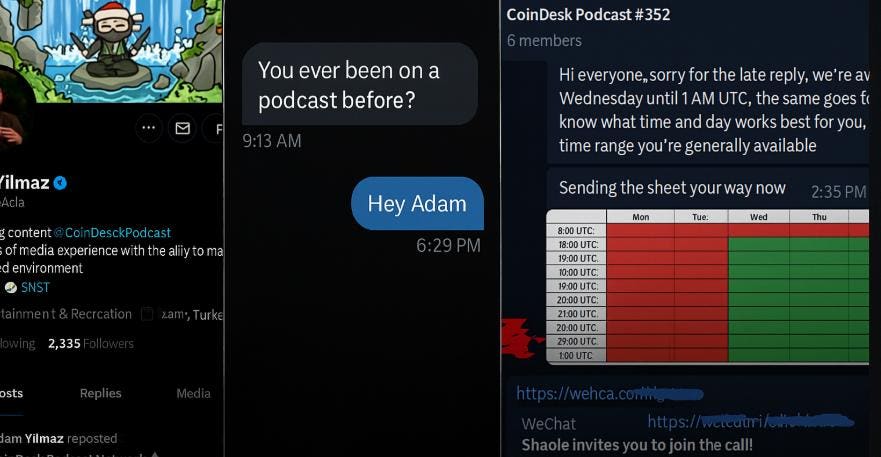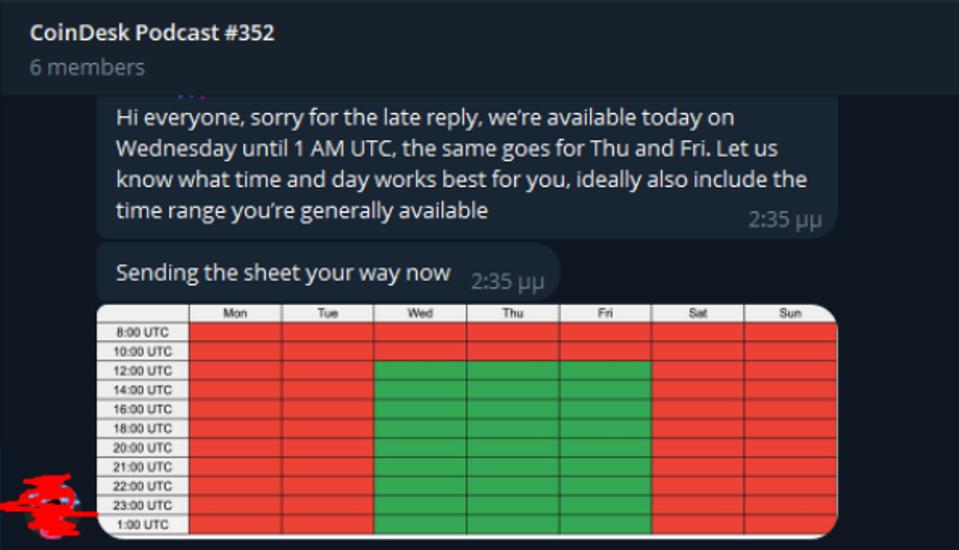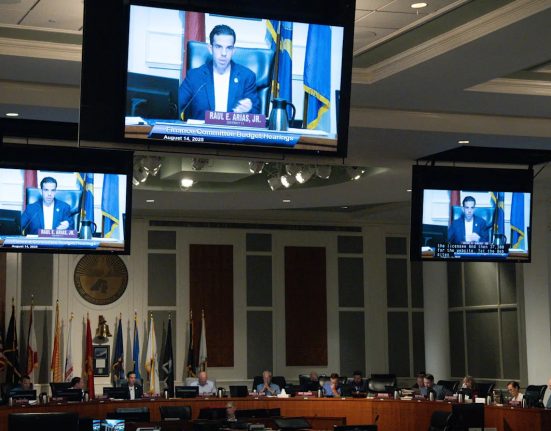It starts with a blue checkmark and a flattering question: You ever been on a podcast before?
You ever been on a podcast before?
The sender? A verified individual supposedly with CoinDesk. The sender might be someone named Adam Yilmaz, using the handle @FinanceAda and presenting himself as affiliated with CoinDesk and other crypto-focused causes. But it is not always him. Similar outreach has been linked to a network of X accounts, including @shaola_dai3 and @Quant_acc. Each of these are different personas, but are following the same script. The message is casual, confident, and deliberately intriguing.
For a Web3 founder, content creator, or technical contributor, an invitation like this signals recognition—and that is exactly what the scammers are counting on.
The Setup: A Fake Group Chat Full of “Professionals”
Scammers send a scheduling question.
Once engaged, victims are added to a Telegram group with a name like “CoinDesk Podcast #352.” The participants? Supposed professors, startup execs, blockchain researchers—all discussing availability, formats, and timing. A group calendar is shared. Time zones are sorted out. It looks and feels like any other podcast coordination.
Only it’s not.
Whether the original message came from @FinanceAda, @shaola_dai3, @Quant_acc, or someone not yet on our radar, the follow-through is always the same: an attempt to ease the target into trusting the group and lowering their guard. The scam is designed to feel real. There is no rush, no pressure—just professionalism.
That is part of the brilliance. You are not being asked for crypto or credentials yet. You are being included.
The Trap: A WeChat Link and a Stolen Identity
Scammers send you a phishing link, disguised as a message asking to join a call for the podcast.
Then comes the scheduled recording. Only, instead of a Zoom or Google Meet link, you get a WeChat or another third-party platform invite.
The link is suspiciously long. The preview is generic. There is no CoinDesk branding, no moderator name—just a vague message: “Shaola invites you to join the call.”
Clicking that link can lead to credential harvesting, wallet draining, or malware installation. And if you connect a hot wallet during the interaction, you may never see your assets again.
We reached out to @FinanceAda, @shaola_dai3, and @Quant_acc—each of whom has been connected to these scams—for comment. None responded.
The Aftermath: A Trail of Victims
A growing wave of reports on X confirms that this scam is not just theoretical; it is actively harming users.
User @BenjjjiWalker publicly warned others after falling victim:
“This is a complete scam @1NationUnderXRP, I lost over $9000 after interacting with this impersonators.”
Another user, @Hugcteelse, replied in solidarity:
“I also experienced the same situation as yours…”
These are not isolated experiences. Dozens of replies under posts mentioning “Coinbase podcast” or “Adam Yilmaz” describe identical setups: a flattering DM, a fake Telegram group, and a wallet-draining link disguised as a recording invite.
What unites them all is a single misstep—trusting that the opportunity was real.
Why It Works: Social Engineering with a Crypto Twist
Lowering your guard through a harmless, casual message.
Crypto culture normalizes casual Telegram groups and cold invites. Founders are used to last-minute collabs and chaotic scheduling. Scammers exploit that openness by mimicking what legitimate outreach looks like: right down to group chats and scheduling polls.
There is no poor grammar. No urgent call to action. Just the illusion of opportunity. That is what makes it dangerous.
How to Stay Safe
- Verify any media requests by reaching out to the organization through their official site or press contact;
- Do not click links shared via Telegram without verifying the sender’s identity through another platform; and
- Avoid entering private keys or connecting wallets on any site unless you’re 100% certain it’s secure.
The Broader Operation
The operation is coordinated and it is getting more sophisticated. These scammers are not just faking a podcast; they are faking professionalism. In a space built on trustless systems, this scam relies entirely on trust. Don’t allow your trust to be taken advantage of in hopes of exposure for you and your project. The psychological warfare is unrelenting. Stay vigilant.
If you believe you’ve interacted with this scam or had assets stolen, report the incident to your local cybercrime unit or financial authorities. In the U.S., you can file a report with the Internet Crime Complaint Center (IC3) at ic3.gov, or notify the FTC at reportfraud.ftc.gov.
While recovery may not always be possible, documenting the scam helps build the case against coordinated operations like this, and may help others avoid the same scam.








